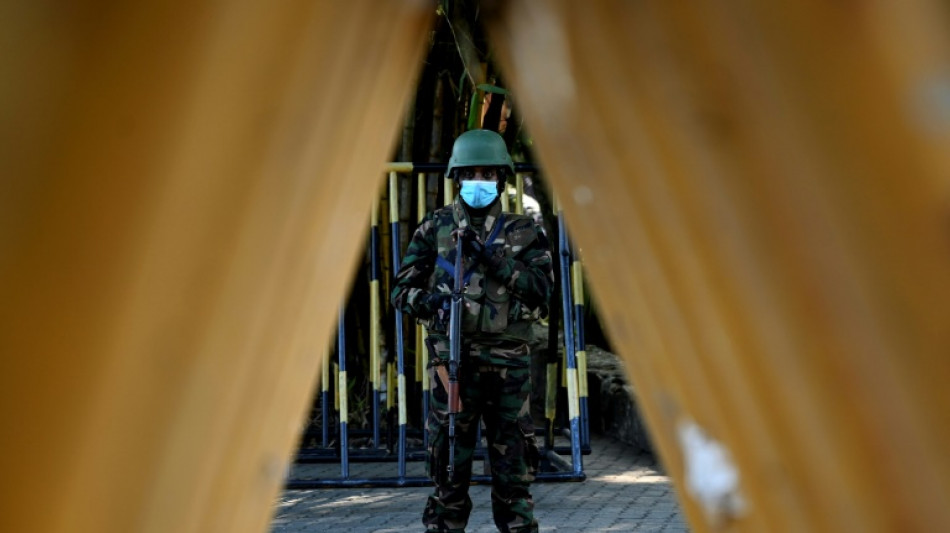

Sri Lanka protesters defy curfew after social media shutdown
Armed troops in Sri Lanka blocked a Sunday opposition march that defied a weekend curfew to protest the island nation's worsening economic crisis, after authorities imposed a social media blackout to contain public dissent.
The South Asian nation is facing severe shortages of food, fuel and other essentials, along with record inflation and crippling power cuts, in its most painful downturn since independence from Britain in 1948.
President Gotabaya Rajapaksa imposed a state of emergency on Friday, the day after a crowd attempted to storm his home in the capital Colombo, and a nationwide curfew is in effect until Monday morning.
The Samagi Jana Balawegaya (SJB), Sri Lanka's main opposition alliance, denounced a social media blackout aimed at quelling intensifying public demonstrations, and said it was time for the government to resign.
Troops armed with automatic assault rifles moved to stop a protest by opposition lawmakers and hundreds of their supporters attempting to march to the capital's Independence Square.
The road was barricaded a few hundred metres from the home of opposition leader Sajith Premadasa and the crowd engaged in a tense stand-off with security forces for nearly two hours before dispersing peacefully.
"President Rajapaksa better realise that the tide has already turned on his autocratic rule," SJB lawmaker Harsha de Silva told AFP at the rally.
Fellow SJB legislator Eran Wickramaratne condemned the state of emergency declaration and the presence of troops on city streets.
"We can't allow a military takeover," he said. "They should know we are still a democracy."
Facebook, YouTube, Twitter, Instagram and WhatsApp were among the platforms shut down Sunday on the orders of defence authorities, internet service providers told their subscribers.
Private media outlets reported that the chief of Sri Lanka's internet regulator resigned after the order went into effect.
The streets of the capital stayed largely empty on Sunday, apart from the opposition protest and long lines of vehicles queued for fuel at service stations.
Mass protests had been called on social media before the ban went into effect, and organisers have since postponed the rallies until after the curfew is lifted on Monday.
Small crowds defied the curfew on Saturday night to hold peaceful demonstrations in various neighbourhoods around Colombo which broke up without incident.
- 'Completely useless' -
Cracks in the government have emerged, with the president's nephew Namal Rajapaksa announcing he had urged the government to reconsider the partial internet blackout.
"I will never condone the blocking of social media," said Namal, also the country's sports minister.
"The availability of VPN, just like I'm using now, makes such bans completely useless."
The anti-government hashtags "#GoHomeRajapaksas" and "#GotaGoHome" have been trending locally for days on Twitter and Facebook.
A social media activist was arrested Friday for posting material that could allegedly cause public unrest. He has since been bailed.
Hundreds of lawyers have volunteered to represent anti-government protesters arrested by the authorities. Sri Lanka's influential Bar Association has also urged the government to rescind the state of emergency.
Western diplomats in Colombo expressed concern over the use of emergency laws to stifle democratic dissent and said they were closely monitoring developments.
Solidarity protests were staged elsewhere in the world over the weekend including in the Australian city of Melbourne, home to a large Sri Lankan diaspora.
A critical lack of foreign currency has left Sri Lanka struggling to service its ballooning $51 billion foreign debt, with the pandemic torpedoing vital revenue from tourism and remittances.
The crisis has also left the import-dependent country unable to pay even for essentials.
Diesel shortages have sparked outrage across Sri Lanka in recent days, causing protests at empty pumps, and electricity utilities have imposed 13-hour blackouts to conserve fuel.
Many economists also say the crisis has been exacerbated by government mismanagement, years of accumulated borrowing, and ill-advised tax cuts.
Sri Lanka is negotiating with the International Monetary Fund for a bailout.
L.Flores--LGdM




